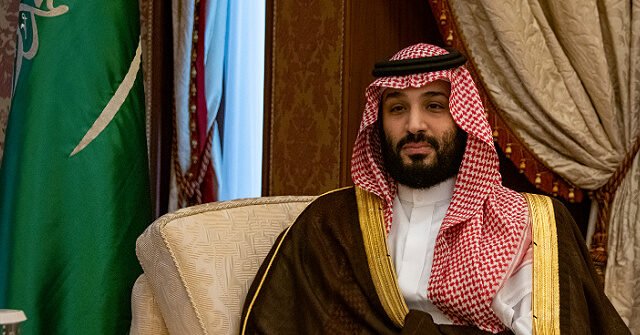The government of Russia confirmed on Tuesday that Saudi Arabia is not yet an official member of the anti-American BRICS coalition, claiming that the Middle East will formalize its position one way or the other at this month’s summit.
Kremlin spokesman Dmitry Peskov issued a statement clarifying that Riyadh does not officially belong to BRICS after another Kremlin official, aide Yuri Ushakov, named Saudi Arabia as a member a week ago, according to Reuters. The Russian government is preparing to host the annual BRICS summit in the city of Kazan beginning on October 22.
BRICS is an economic, security, and diplomatic alliance that initially consisted of Brazil, Russia, India, China, and South Africa, the countries that gave it its name. The BRICS countries voted to expand membership a year ago and extended invites to six nations: Egypt, Iran, Saudi Arabia, the United Arab Emirates (UAE), Argentina, and Ethiopia. Argentina, under the new leadership of anti-communist President Javier Milei, plainly declined the invite, while the others publicly accepted.
Saudi state television announced in January that the country had begun its membership term in BRICS, reports that went widely unquestioned as Saudi Crown Prince made an appearance at an emergency BRICS event in November to condemn Israel’s self-defense response to the atrocities committed by Iran-backed terrorist organization Hamas on October 7 of that year.
By the end of the month, however, its status became murky, as reports surfaced that Riyadh had not finalized the process to join the coalition.
“Saudi Arabia has not yet responded to the invitation to join BRICS. It is still under consideration,” an anonymous Saudi source told Reuters.
South African Ambassador to Russia Mzuvukile Geoff Maqetuka told the Russian news agency Tass in February that Saudi Arabia was “still going through its own processes” and “has not yet endorsed” membership.
Little updates have surfaced in February on whether Saudi Arabia is a formal member of BRICS or not. When Ushakov listed Saudi Arabia among BRICS members while discussing the upcoming summit, few questioned the addition.
Peskov, the Kremlin spokesman, specified that Saudi Arabia’s status remains unclear as of Tuesday.
“The summit will take place now, we will supply additional information on who will represent Saudi Arabia, whether it will be represented at this summit, and we will draw conclusions from this,” Peskov said.
Reuters reported on October 10 that, despite the BRICS summit typically attracting the heads of government of its member countries, Mohammed bin Salman was expected not to attend. That report cited Ushakov, who claimed nine out of ten BRICS countries would send leaders, while Saudi Arabia would send Foreign Minister Prince Faisal bin Farhan Al Saud.
“Two sources with direct knowledge of the matter told Reuters in January that Riyadh was still considering the invitation to join BRICS,” the outlet added.
BRICS was created to foster an alternative to the Western-led global order and has proposed a variety of policies to undermine the United States specifically, including plans to drop the U.S. dollar as its international trade currency and a united front in defying Western-led human rights sanctions. Saudi Arabia, as a longtime close ally of America’s is an unlikely candidate for BRICS membership, particularly given the full member status of its top geopolitical rival, Iran.
The Saudi government began to drift away from American influence, however, under the ongoing presidency of Joe Biden. Biden antagonized Riyadh as a presidential candidate, promising to turn the country into a “pariah” over the gruesome killing of Islamist writer Jamal Khashoggi at a Saudi embassy. After taking over the White House, Biden rapidly moved to take international measures that challenged Saudi Arabia’s national security interests, including delisting the Yemeni Houthis, an Iran-backed terrorist organization that had repeatedly bombed Saudi Arabia, as a foreign terrorist organization. Biden also froze sales of American offensive weapons to Saudi Arabia as he expanded financial opportunities for the Houthis through the delisting.
Three years later, the Houthis are an existential threat to global shipping as they have launched a campaign attacking commercial ships in and around the Red Sea, seemingly at random. Biden claimed in January that his decision to delist the Houthis was “irrelevant” to their growth as a terrorist entity.
The Saudi government, meanwhile, moved out of America’s sphere of influence, reconciling with Iran through a deal brokered in Beijing in March 2023, leading to the invites to both to join BRICS. Biden attempted to reconstruct the broken relationship in a visit to Saudi Arabia in 2022 now colloquially described as the “fist bump summit,” but the summit went poorly, with no concrete deliverables brought home. Shortly after the summit, anonymous reports surfaced that Mohammed bin Salman was openly mocking Biden’s “mental acuity” with his staffers.
Given reports of personal animosity before the crown prince and Biden, and Biden’s decision to drop out of the 2024 presidential campaign, some observers have suggested that the Saudi government is waiting to see the results of the American election before deciding on its BRICS membership. It will likely have to make a definitive move in favor or against membership in the near future, however, as a growing list of countries are actively campaigning to join the anti-Western alliance. Rogue states such as Venezuela and Cuba have openly expressed interest in BRICS. Turkey, a NATO country, has also said it is seeking to join BRICS and is expected to have some level of representation at the upcoming summit.
